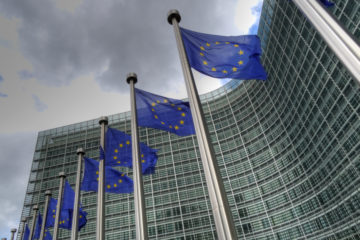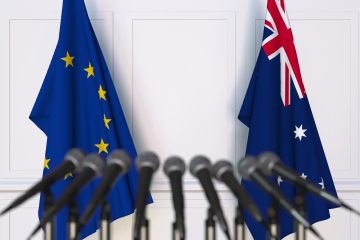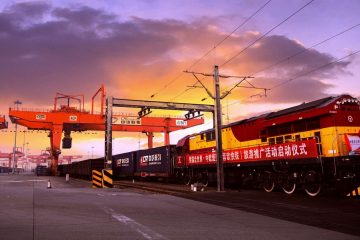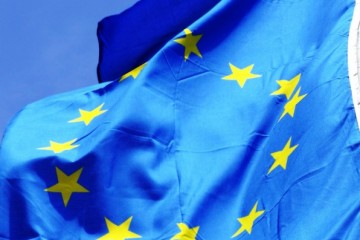
Fiscal Reform in the Eurozone – A Complex Political Issue
With Brexit looming over the health of the European economy and Trump imposing $7.5 billion tariffs on European imports to the United States, the Eurozone faces political challenges. Pitted along a spectrum ranging from pro-stimulus to pro-austerity positions, different politicians advocate for distinct economic futures for the Eurozone. The situation is further complicated by trade disputes, macroeconomic pressures, and a slowing European economy. The outcome of fiscal reform in the Eurozone will depend on who ends up controlling European economic and monetary politics. To address the growing threat to the European economy, the European Union (EU) has confirmed Paolo Gentiloni as the new European Commissioner for Economic Affairs. In his confirmation hearing, Gentiloni presented a reform agenda for the Eurozone …

Consider the Bigger Picture: How to Advance the EU-Australian Trade Negotiations
The EU and Australia have been in negotiations over a Free Trade Agreement (FTA) since 18 June 2018. There is wide-spread agreement that closer ties and increased trade would be mutually beneficial. However, a substantial obstacle is impeding progress: The EU has asked Australia to ensure the protection of speciality goods of regional origin denoted by Geographical Indicators (236 spirits and 172 agricultural and other foodstuffs). A Geographical Indicator (GI) is a distinctive certification sign that is utilised to help identify a product whose quality, reputation and other criteria is linked to its geographical origin. Within the EU, GIs are used to protect agricultural products and foodstuffs, wines and spirits. Examples include parmesan, champagne or Kalamata olive oil. Thus, olive …

Is China’s Belt and Road Initiative Really What Interpreters Make of It?
Without question, the much-debated, mammoth Belt and Road Initiative (BRI), is a brainchild of China’s President Xi Jinping. Without question, Xi Jinping has further centralised his powers and, in the process, China has turned more authoritarian. Yet, understanding this gigantic infrastructure investment initiative simply as a top-down project, directed by an almighty leadership in Beijing, is more than questionable. The BRI is open, plural and ever-changing, and, to a large degree what interpreters, Chinese or otherwise, public or private, make of it. Following the pragmatic attitude which has characterised China’s leadership since Deng Xiaoping’s reforms in the 1980s (‘crossing the river by feeling the stones’), Xi Jinping inaugurated the BRI when a great deal of Chinese overseas investments was already …

London and the rest: regional transport disparities in the UK
Crossrail, still trumpeted as the largest construction project in Europe, and once held up as a paragon of a well-run, on-time and on-budget development, is now late and seriously over budget. Praise has been replaced by political infighting as the blame game gets into full swing and warnings that this will further imperil Transport for London’s (TFL) already shaky looking finances. However, hidden beneath the debris of mismanagement is something much worse: the willingness of the British government to plough vast sums into transport in London, whilst simultaneously underfunding transport in the rest of the country. Across the UK public transport has been de-regulated and privatised under policies originating in the 1980s, yet, London is a treated as a special …

From Oil Wells to Blockchains: Revolution or Reality?
Blockchain is an emerging technology that has drawn considerable interest from start-ups, technology developers, financial institutions, governments, and think-tanks. They all identify blockchains as having tremendous potential to bring significant benefits. This technology acts as an electronic ledger and allow transaction to be carried out between parties without interference by third parties like banks. Energy supply firms are also increasingly looking the potential of blockchain technology. Blockchain has emerged at just the right time. Other revolutions within the energy sector – the decentralization of the electrical systems, the development of autonomous electric vehicles and the gradual deregulation of the energy industry – are opening the door to blockchain. By combining blockchain with new paradigms, new consumption models will emerge and …

The Future of Capitalism: Technological Progress, Block Chains and Karl Marx
As Joseph Schumpeter already pointed out in 1942’s Capitalism, Socialism, and Democracy “dealing with capitalism, we are dealing with an evolutionary process.” The question is in what direction is this process heading? Is the rising power and capital accumulation of FAMGA (Facebook, Apple, Microsoft, Google, Amazon) together with advances in block chains and artificial intelligence leading to the concentration of wealth in ever fewer hands, obsolescence of manual labour and even the destruction of capitalism, as Karl Marx believed in the 19th century? Or, do technological progress and innovation lead to reduced inequality and higher prosperity? Before talking about the future, its key to review the past of capitalism. Technological progress during the Industrial Revolution of the late 18th and early …

Angola’s Perfect Storm
In a new article for Foreign Affairs, I discuss the perils of Angola’s reliance on declining oil revenues. Here are the first few paragraphs. In early 2014, Angola, sub-Saharan Africa’s second-largest oil producer and third-largest economy, was flush with cash and confidence. The economy had expanded tenfold over the previous decade, and the government, which in 2002 won a resounding victory in the country’s long civil war, was unchallenged at home, a towering presence in regional politics, and a major investor abroad, including in Portugal, the former colonial power. Its national reconstruction agenda funneled tens of billions of dollars into infrastructure and transformed Luanda into a would-be African Dubai that attracted thousands of expatriates. The rule of Angolan President José Eduardo …

Exit, voice, and loyalty in Europe
Complex situations often require us to take a step back for what consultants call the 10,000 feet view. The problems facing the EU these days—from Grexit to Brexit—surely seem impenetrable. A convoluted potpourri of economic, financial, and political crises leaves most observers either completely disengaged or increasingly reliant on their gut feelings. To wrap one’s head around the forces that threaten the European project, it helps to think in very simple categories: exit, voice, and loyalty. Few theories still prompt real-life insights almost half a century after their publication. Albert O. Hirschman’s “Exit, Voice, and Loyalty” surely falls into this category. Put simply, Hirschman postulated that members who are unsatisfied with an organisation they are part of, can either exit …









